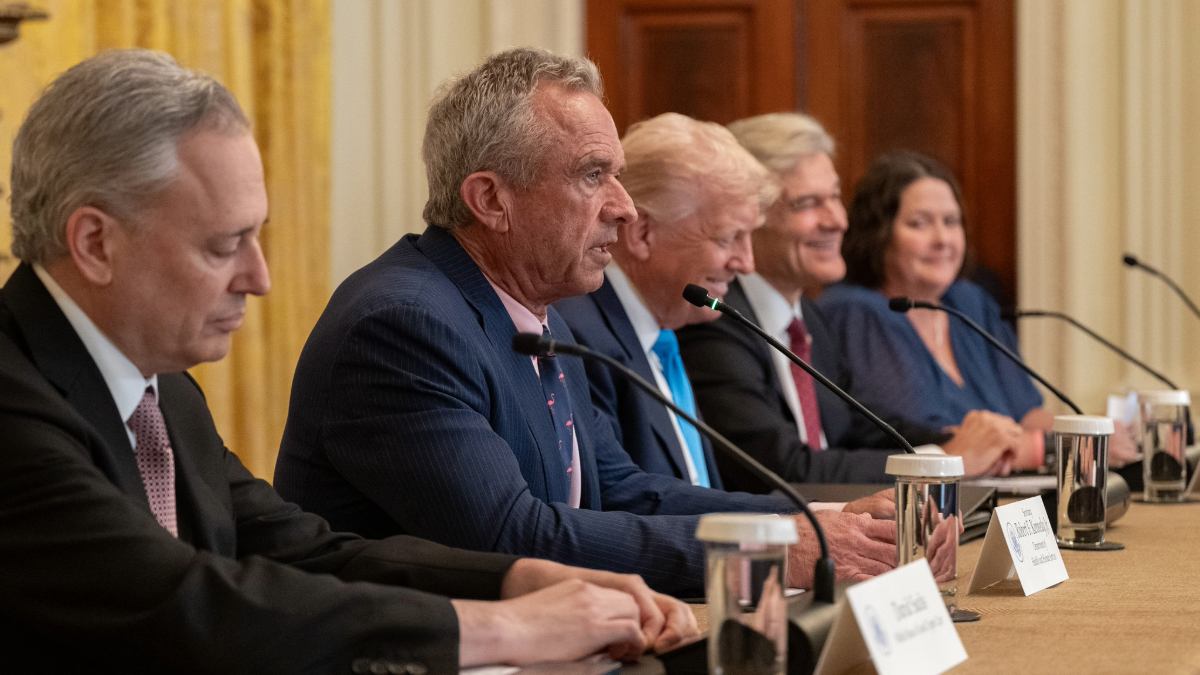How Political Power is Capturing Knowledge Systems and Manufacturing Structural Ignorance
Renée DiResta / Nov 10, 2025This perspective is part of a series of provocations published on Tech Policy Press in advance of a symposium at the University of Pittsburgh's Communication Technology Research Lab (CTRL) on threats to knowledge and US democracy.

Secretary of Health and Human Services Robert Kennedy Jr. delivers remarks at a “Making Health Technology Great Again” event, Wednesday, July 30, 2025, in the East Room of the White House. (Official White House photo by Joyce N. Boghosian)
In January 2025, Meta announced the elimination of its third-party fact-checking program in the United States. A month later, Robert F. Kennedy Jr. — an anti-vaccine activist who had been fact-checked and moderated extensively on Meta platforms for years — was confirmed as the Secretary of Health and Human Services for the 47th President of the United States, Donald Trump. Within months, Kennedy began what career scientists described as a systematic purge of health agencies and advisory panels, replacing domain experts with anti-vaccine conspiracy theorists and close personal allies.
Although Kennedy’s and Meta’s actions emerged from distinct institutional contexts, their temporal and political convergence produces the conditions for comprehensive knowledge suppression for significant segments of the American public: the simultaneous capture of official knowledge-producing institutions and the elimination of independent verification mechanisms.
Agnotology, the study of culturally-induced ignorance, distinguishes between passive knowledge gaps and active ignorance production. What we observe in 2025 represents the latter: a multi-pronged assault on public health’s epistemic infrastructure. External verification mechanisms such as fact-checking programs are dismantled, while government science agencies are transformed into vehicles for politically determined conclusions.
The attacks on epistemological guardrails like fact-checking continue a long-standing pattern. The populist right, particularly under Trump, has long framed fact-checking, which adds more speech to a conversation, as partisan “censorship.” While major technology platforms resisted that framing for several years — including during the COVID-19 pandemic — they appeared to interpret the 2024 election results, and Trump’s promises of retribution against “censors,” as a signal to retreat from content integrity efforts. Meta’s US rollback was especially revealing: it declared fact-checking biased and ineffective even as it had recently praised the same practices to EU regulators in submissions under the Digital Services Act. The geographic arbitrage in policy — maintaining verification infrastructure in overseas markets while eliminating it domestically — suggested a private company making a political calculation rather than an evidence-based determination.
Kennedy’s appointment, meanwhile, followed a presidential campaign in which he ran as the leader of the Make America Healthy Again (“MAHA”) movement, attracting a mixed coalition of those concerned about food safety and child obesity alongside those skeptical of vaccines and public health writ large; Trump’s MAGA movement had strongly aligned around the skepticism. Kennedy framed himself as a truth-teller censored by tech platforms for warning the public about COVID-19 vaccines, 5G, and other conspiratorial claims and positioned himself as a reformer during Senate confirmation hearings.
However, Kennedy’s subsequent actions at HHS were not mere reforms. Instead, he rapidly dismantled the health institutions he was appointed to run. Career scientists were removed and replaced with politically aligned, often unqualified appointees; research priorities were redirected to validate longstanding anti-vaccine conspiracy theories; and agency reports featured apparently fabricated data and AI-hallucinated citations. These changes were accompanied by farcical rhetoric about restoring trust to public health agencies and returning to “Gold Standard” science. The institutional capture for ideological ends evokes historical parallels: under Josef Stalin, Soviet agronomist Trofim Lysenko advanced pseudoscientific doctrines to align with party ideology, while orchestrating the purge of biologists and geneticists who upheld empirical standards. A similar logic appears to be at work in the contemporary subordination of public health infrastructure to political dogma.
The convergence of platform retreat and institutional capture makes this moment particularly dangerous. Federal health agencies have long served as trusted sources for platforms, fact-checkers, journalists, and the public. During public health crises, companies like Meta and YouTube relied on CDC guidance to inform decisions and elevate authoritative information. The simultaneous erosion of trusted sources and the systems that surface them creates an epistemic vacuum in which politically-determined claims may circulate with official imprimatur and limited avenues for effective correction.
Vaccine information is an illustrative example. By early 2020, after a series of high-profile measles outbreaks and tragic incidents involving children whose parents followed bad medical advice from Facebook anti-vaccine groups, major platforms had begun upranking CDC and a handful of other authoritative health organizations in response to vaccine-related queries while also engaging third-party fact-checkers to contextualize rumors and health misinformation. Today, with fact-checking infrastructure dismantled and federal health agencies actively supporting conspiracy theories, false claims may circulate not despite official sources but because of them. The mechanisms for independent verification have been stripped away even as the institutions that once produced trusted knowledge are captured.
This represents what agnotology scholars such as Robert Proctor call "structural ignorance” production. It occurs not merely through the suppression of specific facts but via the transformation of knowledge-producing systems themselves. Both Proctor and Naomi Oreskes (author of Merchants of Doubt) tie ignorance production to power; the goal is often not to convince citizens of particular false claims but to corrode the processes and authorities that can adjudicate truth. While Meta appears inclined to have a regulatory fight in Europe, domestically it appears motivated primarily by the dual benefit of not having to pay to field an expensive fact-checking enterprise, and getting back in the good graces of a President who’d previously threatened to jail their CEO. Kennedy, however, is delegitimizing public health institutions and substituting parallel authorities to advance his longtime politics and grow his ideological movement.
Content moderation during the pandemic became a central grievance in right-wing attacks on fact-checking; despite relatively limited enforcement beyond labeling, intentional exaggeration resulted in misperceptions. X (formerly Twitter) claims to have removed fewer than 9,000 posts under its COVID-19 misinformation policies — far below what ‘mass censorship’ rhetoric implied. Moderation of the lab leak hypothesis, meanwhile, was short-lived and largely limited to Facebook. Still, right-wing populist media advanced the false narrative of a “censorship industrial complex,” grounded in distortions and outright fabrications by Twitter Files authors, such as selectively-cropped emails falsely portraying academics as demanding platforms “censor true stories of vaccine side effects.” Because health policy and political identity are deeply intertwined, a large audience embraced these narratives without questioning them.
Public health depends on citizens accepting scientifically-grounded guidance. When official institutions produce politically-determined science and independent verification infrastructure is eliminated, the capacity for evidence-based health policy collapses. This is agnotology at scale: the strategic construction of conditions where ignorance thrives, not by suppressing specific facts, but by hollowing out the systems that once produced and verified them. Understanding these dynamics as strategic and interlinked is essential for grasping what’s at stake in contemporary assaults on epistemic institutions, and in devising equally strategic responses.
Renée DiResta serves on the board of Tech Policy Press.
Authors
